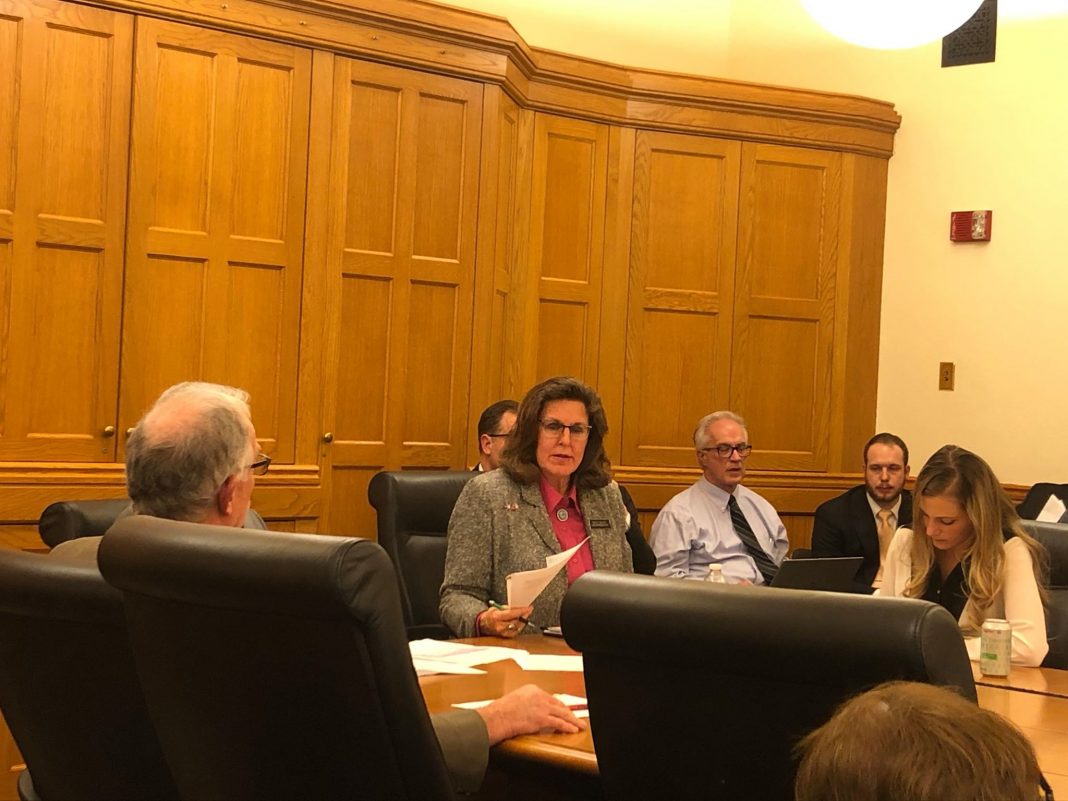Perhaps the week’s biggest subcommittee happened on Monday. A bill that says students are not required to participate in sexual orientation and/or gender identity instruction passed through the Iowa House subcommittee.
Rep. Sandy Salmon filed the bill and chaired the subcommittee.
“It’s just not all parents want others to teach their children about sex education because it involves family, religious beliefs about sexuality — not all parents want others to teach their children about sexual orientation and gender identity because it too involves family, religious beliefs and sexual ethics.:
Lance Kinzer of the First Amendment Partnership said the bill is a bill in support of parental notification. It allows parents to opt-out their children out of such instruction but does not prohibit or require any curriculum or instruction in public schools.
“The question of the role of parents and context of sensitive topics of human sexuality and unrelated matters,” he said. “Only half of the states mandate sex education. The vast majority of states agree that when such instruction is provided, either as a matter of state law or a local district’s choice, it makes sense for basic guidance role of families. Parents have advanced notice and an opportunity to opt children out. A few states opt-in.
That policy with respect to sex education is extended to any instruction if it’s regarding sexual orientation and gender identity.
Kinzer referred to the University of Iowa Public Policy Center report that we detailed here. The report called for the integration of LGBT inclusive curriculum in every grade and every subject.
Some schools, to varying extents, do provide instruction on gender identity and sexual orientation.
“I’ve heard some raise the concern that this bill could be overly broad and, as an example, any passing mention to the fact that some historical figure was married, because after all, the definition of sexual orientation includes heterosexuality, could trigger the law’s requirement. That would require a strained reading of the bill.
“Even the most expansive reading of the bill as currently drafted is parents can be informed so they can participate in educational decisions that impact their child. Some people legitimately believe parents should be denied access to information on what children are taught on a sensitive subject. Iowa already has a good model in place drawing from existing law on human growth and development curriculum. It favors parental involvement.”
Kelly Piper of the Iowa Association of School Boards was the first person to speak against the bill. She provided strong opposition on behalf of the Iowa Association of School Boards. Despite being just the third person to speak, she started her presentation saying, “it was interesting to me to listen to the discussion because I think it presents so many potential issues and problems.”
“It’s not about not letting parents know what’s going on,” Piper said. “This isn’t about teaching about how to be gay or whatever, it is about teaching history. And, if we taught a history lesson with Harvey Milk in it, who was an activist, we would have to then notify the parents every time that happened they have the right to pull their kid out of class. I think that this is very disruptive. Frankly, the procedures for opting out go far beyond what is currently required of districts with respect to human growth and development.”
The Iowa Association of School Boards is “very strongly opposed.”
“The whole approach is going to create a lot of problems with a school trying to figure out when in the curriculum do they have to notify if this is going to come up,” Piper said.
She asked if talking about current events and a presidential candidate running for the Democrat nomination who is gay would even be a conversation allowed in class without first notifying parents.
“The appropriate place to take concerns is the school board and have the discussion at that level,” she said. “Vote for somebody else for school board. We cannot erase what history is. We cannot erase current events simply because we are worried that children are being taught about those contributions. So, I really hope this bill doesn’t move forward.”
Kennan Crow of One Iowa Action said the bill is more onerous than people are being led to believe. He said there were additional disclosures on top of what’s included in human growth and development.
“Thre requirement any organization that wants this information, it doesn’t matter if they’re associated with a school or not, would then be able to ask for that information as well — it’s not just about parents,” he said. “But all these other organizations that would want that information. Which, once again, creates a more and more onerous burden.
Crow claimed sexual orientation and gender identity are not things only homosexual and transgender people have.
“Straight people have a sexual orientation, it’s straight,” he said. “I worry that what’s really going to happen in this bill is any time we talk about someone who might be married, regardless of who they’re married to, it will trigger disclosure. If someone identifies as a man, it will trigger the requirement.
“What we’re really talking about is practically anyone. We know when folks have LGBTQ inclusive curricula they tend to do much better.”
Lorilei Baker, a mental health professional, launched right into comparing homosexuals to African Americans.
“We are in the middle of black history month,” she said. “Why do we celebrate black history in this country?”
Baker said it’s because it helps minority groups see themselves in history and know the value of their worth.
She added that demonizing and vilifying discussions about even the mention of LGBTQ people is based on “erroneous” fears that discussing LGBTQ people might cause children to question their own gender or sexual identity.
“Talking about something does not make it happen,” she said. “We cannot decrease hatred of people by limiting information and access. The bill is based on the belief being anything other than heterosexual, cisgender is somehow inherently wrong or immoral.”
She finished by accusing the state government of wanting to prevent discussion of who LGBTQ students are. That state government wants to criminalize their identity and erase their existence.
“Bills like this tell you your government believes you are unworthy, your very existence is unwanted and unwelcomed in this world,” Baker said.
Pastor Brad Cranston said it’s important to recognize the issues is first and foremost a parental rights issue.
“And the issue being discussed, LGBT lifestyle, is a controversial issue,” Cranston said. “Not everybody in this state, myself included, believes that there is nothing wrong with these lifestyles.”
His biblical worldview tells him there is something “very definitely wrong” with the lifestyle.
“The parent who is responsible for a child has every right to know exactly what the public school is teaching their kids,” Cranston said.
He took exception to the idea that discussing any person from history married to anyone would trigger the bill.
“Nobody in this state is objecting to our kids being taught that somebody is a man or somebody is a married heterosexual,” Cranston said. “That’s not the issue. That’s not a controversial issue. The controversial issue is LGBTQ and how those things are being taught.”
Cranston said historians have revised Harvey Milk’s life. Milk, he said, supported the entire homosexual, bisexual cross-dressing agenda. He added that Milk refused to acknowledge STDs were spread by that behavior. He also said Milk was a sexual predator of teen boys. Milk also advocated having multiple sex relationships at the same time and promoted lying to get ahead.
“This was Mr. Milk’s legacy,” Cranston said. “Parents have the right to know when it comes to controversial issues what their children are being taught in the schools they are paying for with their tax dollars.”
Finally, Cranston took exception to Baker’s comparison of African Americans and homosexuals.
“That is a completely different issue,” he said. “Nobody is suggesting that we do not appreciate and honor African Americans. To connect these two issues is a constant way that the folks on the other side of the aisle try to make this all normal and sound all fine and good. It is not the same. It’s very, very different.”
Lea Farho, an English teacher at Des Moines Roosevelt, testified in opposition to notifying parents about instruction about gender identity and/or sexual orientation.
Joan Thompson of the Iowa Catholic Conference said her group supports the bill.
“Over the past 50 years, the school system has dramatically expanded its presence in the lives of children,” she said.
A.J. Potter, a pastor, said he was speaking from the stance of a parent. With children anywhere from fourth-to-10th grade, he said this is right in his wheelhouse.
“I’ve read the bill several times and, from what I understand, it doesn’t say not to teach any of this stuff,” he said. “It’s just giving me, a parent, the right to understand why my children might be learning, what my children might be hearing. There are certain aspects of me as a parent raising my children, I want to be in control of that.”
While those in opposition said they were concerned about silencing schools on the LGBTQ issues, Potter said they’re in effect silencing parents.
“I want to have the opportunity to be a parent to my children,” he said. “I don’t believe, ás a parent, that a state or a school has the right to teach my children what maybe I don’t want them to be taught. They’re taking my right as a parent out of my hands, as if the state is saying they can be a better parent to my children.”
Pastor David Olson from Ankeny said in the past he has worked for a rehab drug and alcohol sector for 14 years where he dealt with many homeless people.
“I was homeless at one time,” he said. “So I’m familiar with that lifestyle. We dealt with a lot of clients who were coming out of the homosexual lifestyle and some who continued in that lifestyle, but we were there to help them with their drug addiction.”
Olson said his biggest issue is that the realm of severing gender identity from biological sexuality is “not based in science.”
“That belongs more to the subject realm of ethics and philosophy, it is not science,” he said. “Philosophy and ethics are based on someone’s worldview. Presuppositions and biases are brought to the table.”
He said it is his belief that we should stick to “verifiable science.” Olson said he has seven children, and he would like to influence his children in those areas.
“My kids are free thinkers,” he said. “My adult children now don’t always agree. But, when they’re small, it’s my job to shape their belief system.”
Olson said he read a statistic that 98 percent of boys diagnosed as gender-confused and 88 percent of gender confused girls eventually accept their biological sex after naturally passing through puberty.
“That is a natural thing, they will identify with both males and females because they have influence from those two groups of people,” he said. “For us to validate that during an impressionable time I think is dangerous. There’s mounting evidence of people who have transitioned, even medically, who now regret that and are reversing their transition.”
Olson said he has friends in the homosexual lifestyle. Some have escaped, others have never left.
“But they’re not children, they’re adults who can make their own decision,” he said. “I just think that’s left to parents. As a Christian, I’m often told Christians are against science. I’m all for science, but let’s have some verifiable science and let’s base this on things that are observable and provable.”
Damian Thompson of GLBT Youth In Iowa Schools Task Force (Iowa Safe Schools) labeled the legislation a “don’t say gay” bill.
“(It) only continues this year’s legislative trend of marginalizing and attacking LGBT,” said Thompson, who worked previously in Governor Kim Reynolds’ office and interned with Congressman David Young. “By even having this debate, right now the Iowa legislature is contributing to higher suicide risks among LGBT. We need to be creating safer, more inclusive schools. This bill does the exact opposite.”
Daniel Sunne of The FAMiLY Leader, testified next in support of the bill. He referenced a new curriculum kit released by GLBT Youth In Iowa Schools Task Force (Iowa Safe Schools), Schoolwide Pride.
Sunne referenced a Dec. 10 board meeting where, according to Sunne, a member referenced how many parents would be angry if they read the Iowa University Public Policy Report and knew what was happening.
“This is an important bill for parental rights,” he said.
Tamara Scott of CWA Iowa.
“On a national level, parents are asking for bills like this,” she said. “In fact, they’re often asking to opt-in. Too often they’re not given notification in time to stop something presented to children. Let’s just be fairly honest, whatever you think of this material, it’s sensitive at best. Parents have full responsibility and a role in their children’s lives.”
Scott quoted Wilhelm Reich, a communist, sexual revolutionist from the 1940s. She said he wrote in his book that if you sexualize children, it will do the job.
“We do not discuss the existence or nonexistence of God, we merely eliminate the sexual repressions and dissolve the infantile ties to the parents by sexualization,” she read.
Scott then provided a critique of the arguments against the bill made by school officials.
“When a school says no, they’re too busy to let parents know what they’re doing to children, what an alarming statement in itself,” Scott said.
She said if they’re truly concerned about the bill resulting in so many disruptions, perhaps that shows just how much time is devoted to these topics.
Scott said when these issues are mentioned to children, it “absolutely” influences kids. She said it desensitizes kids.
She took issue with the claims that allowing students to transition to the opposite gender leads to decreased suicide risks.
“Let’s be honest about this, there is no evidence so-called gender-affirming treatment has any positive long-term effect,” she said. “People do have high rates of suicide before, with rates nine times the general populations. A study from Sweden, a highly affirming country for LGBT citizens, shows undergoing the gender-affirming treatment did not reduce the suicide rate. It was 19 times that of the general population.
“So we’re not really dealing with the facts and science even.”
Dr. Colin Wright of the University of California Santa Barbara recently wrote, “the claim that classifying people’s sex upon anatomy and genetics ‘has no basis in science’ has itself no basis in reality, as any method exhibiting a predictive accuracy of over 99.98 percent would place it among the most precise methods in all the life sciences.”
Scott said putting kids on gender-affirming treatments is putting kids in peril. In Oregon, she said, treatments were given without parental permission. In Minnesota, a child was started on treatment without parental notification.
“Some cases are irreversible,” she said. “You get into cross-sex hormones, puberty blockers, you’re talking infertility. You’re talking irreversible situations and much more depression. Brittle bones in 20-30-year olds. Broken hips and other things happening as side effects of growth hormone blockers.
“This is our children’s health. As parents, we’re thankful for teachers who love them as well. But we’re the parents who raise them, who are responsible for them — not just for their happiness and their wellness on Earth but for eternity.”
Rep. Art Staed said there was a lot of misinformation that needed to be clarified. He said he attended a Catholic college in the 1970s and learned about gender identity.
“What God did when He created individuals, He didn’t make us just man and woman but many individuals have genitalia of both sexes. A spectrum. We have individuals who are confused about their identity, those who love members of the same sex. Shouldn’t students have an opportunity to discuss those in class?”
Staed said he sees the bill as intolerance.
“Showing individuals where, for whatever reason, maybe they misunderstand, maybe it’s been taught from their pulpits, but they do not believe that individuals should hear about, learn about, have access to that information,” Staed said. “I disagree.”
Rep. Tom Moore provided lukewarm support for the bill. He took the parental perspective to look at the bill as well as the perspective of school systems.
“I am one of those who believes that the parent has to be involved,” Moore said. “And, believe me when I say, as a parent I was involved. And I made sure that I knew what my kids were being taught.”
Moore said when he taught, students would ask him questions about topics that, when brought up, he simply told them he wouldn’t answer because it’s up to their parents.
He turned, though, saying the bill still has things that need to be worked out.
“I also believe this is a bigger discussion than for the three of us,” he said. “(The bill) is not ready to move forward, But, the discussion is. So therefore, I’m going to support this in committee.”
Salmon signed the bill through the subcommittee.












